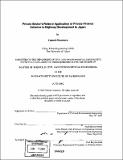| dc.contributor.advisor | Fred Moavenzadeh. | en_US |
| dc.contributor.author | Imamura, Takashi, 1972- | en_US |
| dc.contributor.other | Massachusetts Institute of Technology. Dept. of Civil and Environmental Engineering. | en_US |
| dc.date.accessioned | 2006-11-06T18:15:56Z | |
| dc.date.available | 2006-11-06T18:15:56Z | |
| dc.date.copyright | 2002 | en_US |
| dc.date.issued | 2002 | en_US |
| dc.identifier.uri | http://hdl.handle.net/1721.1/34348 | |
| dc.description | Thesis (S.M.)--Massachusetts Institute of Technology, Dept. of Civil and Environmental Engineering, 2002. | en_US |
| dc.description | Includes bibliographical references (p. 245-247). | en_US |
| dc.description.abstract | The highway development program in Japan is currently at an important transition point. Necessary policy reforms, triggered by the public's increasing and intensifying criticisms, are under discussion. These criticisms are generally concerned with the financial difficulties in the program. Along with these policy reforms, the government should also consider applying Japanese Private Finance Initiative (or PFI) to highway infrastructure. Since its enactment in 1999, the governments have applied Japanese PFI in increasing number of occasions. However, primarily because of the difficulties for applying PFI to a large-scale infrastructure, they have not applied PFI in highways; PFI highway projects have not yet been realized in Japan, despite their potential advantages. The analysis begins by reviewing how public-private partnerships (or PPP) work in highway projects, based on the worldwide observations and the specific experiences in the United States and the United Kingdom. The governments' original intent in organizing PPP in their highway development, and the effectiveness and difficulty of PPP implementation are examined. Also, the thesis discusses how PPP changes the work that private companies do on highway infrastructure projects. Next, the thesis examines how the private companies must work with the government in PFI highway projects in Japan. What is the most important contribution? What is the most desirable working environment? The analyses of Japan's highway development program reveal that private companies must innovate their technology and manage risks efficiently to reduce the public expenditure. On the other hand, they need the government support in preliminary project planning and financial contributions. Finally, the thesis introduces a new project planning method that construction companies can use to more effectively bid in PFI highway projects and thus increase their chances for selection. The study considers that the method should maximize Value for Money (or VFM) in PFI highway projects for the government, while maintaining debt repayment capacity of the project and reasonable profits for the operator companies. The method presents an improved approach to consider interrelationships among major cost items and project scheduling, and configure them to make the most of the companies' efforts in achieving the highest possible VFM in PFI highways. | en_US |
| dc.description.statementofresponsibility | by Takashi Imamura. | en_US |
| dc.format.extent | 247 p. | en_US |
| dc.format.extent | 17535980 bytes | |
| dc.format.extent | 17547243 bytes | |
| dc.format.mimetype | application/pdf | |
| dc.format.mimetype | application/pdf | |
| dc.language.iso | eng | en_US |
| dc.publisher | Massachusetts Institute of Technology | en_US |
| dc.rights | M.I.T. theses are protected by copyright. They may be viewed from this source for any purpose, but reproduction or distribution in any format is prohibited without written permission. See provided URL for inquiries about permission. | en_US |
| dc.rights.uri | http://dspace.mit.edu/handle/1721.1/7582 | |
| dc.subject | Civil and Environmental Engineering. | en_US |
| dc.title | Private sector's roles in application of private finance initiative to highway development in Japan | en_US |
| dc.type | Thesis | en_US |
| dc.description.degree | S.M. | en_US |
| dc.contributor.department | Massachusetts Institute of Technology. Department of Civil and Environmental Engineering | |
| dc.identifier.oclc | 50572948 | en_US |
